- Home
- Muriel Spark
The Golden Fleece Page 9
The Golden Fleece Read online
Page 9
Like most people outside of France I had not read Proust in the hey-day of my mother’s hats. If I had, I would have seen in my mind’s eye Odette promenading in the Bois with her author, Marcel. In fact, so wonderful were the hats of duchesses and lesser girls in Proust’s experience it is recorded that, as he aged, and was writing A La Recherche, he sent round to one of his titled ladies to ask, would she kindly send her maid to him with that delightful hat she had worn on some distinguished occasion years and years before. ‘My dear fellow,’ she replied, ‘it is gone and disposed of long ago.’ Proust, it is said, could hardly believe that the poetic hat of his memory no longer existed.
We had a family friend, Sheila Fagan,* who, being widowed, sometimes came to give my mother a hand in the house. Sheila was tall, slim and naturally fair-haired. My father always had a soft spot for Sheila, a very genial, kind woman. One day my mother and I returned home to find my father and Sheila having reasonably innocent fun with my mother’s fantastic hat collection. Sheila was trying them on, one by one. I don’t remember the outcome. I suppose I went off to play, but I felt something in the air.
Sheila eventually married again, to a prosperous man. But I think she had a soft spot for my father. In the ’seventies I was the go-between on the phone for Sheila and my father. ‘Yes, Sheila, he was asking for you, Sheila.’ (He wasn’t.) After his death Sheila and my mother got together and were the best of friends from then on.
In the late ’thirties I went to the then Southern Rhodesia, now Zimbabwe. My mother wrote exultantly that she had been asked to a garden party. Letters were then sent by sea; they took two weeks to arrive. I wondered what hat my mother would wear and waited anxiously for the next mail. I had misgivings. The garden party was in aid of a Jewish benefit. The Jewish community of Edinburgh had, like minorities everywhere, taken on some of the habits, forms and social colourings of their neighbours.
I had written in time, as I thought, to remind her that in wartime the fashions were somewhat subdued, but I have no doubt she went to the party crowned with one of her floral tributes and a dress to match. ‘It was very dreary,’ she wrote. ‘They were all wearing tweeds.’
Have I inherited any of this garden party tendency? – Perhaps. The other day, going through my clothes, I noticed a preponderance of drifting chiffon. I tend to grab off the peg things that look good. Years ago I underwent a phase of haute couture but the numerous fittings that the Diva-like dressmakers demanded piteously ate up my precious working mornings. ‘Madame, I could not possibly let you leave my atelier without a half-centimetre off each shoulder…’ I had work to do. So I got to snatching my clothes without even trying them on. Hence, when I rummage for a pair of jeans, all these floating-island chiffons come to light. There is little one can do with them. Where I live, in Tuscany, women pass on their clothes to a house of nuns who pass them on to the needy, or even wear them under their habits. (They looked up their Rules, which limited themselves to prescribing ‘warm stuff’ for underclothes.) But clouds of transparent nylon and beaded velvets? They are called for from time to time, it is true. But mainly they beautifully hang there for some useless celestial occasion, as should the ties of the TV announcers.
As for the hats, I was so fascinated by a multi-hat shop in Venice that I started writing a poem about it. My handbag was snatched later, in Florence, with my poem in it. ‘How did the poem go?’ asked the policeman, his pencil poised.
‘I wish I knew,’ I replied.
[2002]
* Not her real name.
What Images Return
In the spring of this year I was obliged to spend some weeks in the North British Hotel* in Edinburgh, isolated and saddened by many things, while my father’s last illness ran its course in the Royal Infirmary. It was necessary for me to be within call. I do not like the public rooms and plushy lounges of hotels anywhere in the world, I do not sit in them; and least of all in one’s native city is it spiritually becoming to sit in the lounges of big hotels.
I spent most of my time in my room waiting for the hours of visiting my father to come round. I think at such times in one’s life one tends to look out of the window oftener and longer than usual. I left my work and my books and spent my time at the window. It was a high, wide window, with an inside ledge, broad and long enough for me to sit in comfortably with my legs stretched out. The days before Easter were suddenly warm and sunny. From where I sat propped in the open window frame, I could look straight on to Arthur’s Seat and the Salisbury Crags, its girdle. When I sat the other way round I could see part of the Old City, the east corner of Princes Street Gardens, and the black Castle Rock. In those days I experienced an inpouring of love for the place of my birth, which I am aware was psychologically connected with my love for my father and with the exiled sensation of occupying a hotel room [instead of my family home] which was really meant for strangers.
Edinburgh is the place that I, a constitutional exile,* am essentially exiled from. I spent the first 18 years of my life, during the ’twenties and ’thirties, there. It was Edinburgh that bred within me the conditions of exiledom; and what have I been doing since then but moving from exile into exile? It has ceased to be a fate, it has become a calling.
My frequent visits to Edinburgh for a few weeks at a time throughout the years have been the visits of an exile in heart and mind – cautious, affectionate, critical. It is a place where I could not hope to be understood. The only sons and daughters of Edinburgh with whom I can find a common understanding are exiles like myself. By exiles I do not mean Edinburgh-born members of Caledonian Societies. I do not consort in fellowship with the Edinburgh native abroad merely on the Edinburgh basis. It is precisely the Caledonian Society aspect of Edinburgh which cannot accommodate me as an adult person.
Nevertheless, it is the place where I was first understood. James Gillespie’s Girls’ School, set in solid state among the green Meadows, showed an energetic faith in my literary life. I was the school’s Poet and Dreamer, with appropriate perquisites and concessions. I took this for granted, and have never since quite accustomed myself to the world’s indifference to art and the process of art, and to the special needs of the artist.
I have started the preceding paragraph with the word ‘nevertheless’ and am reminded how my whole education, in and out of school, seemed even then to pivot around this word. My teachers used it a great deal. All grades of society constructed sentences bridged by ‘nevertheless’. It is my own instinct to associate the word, as the core of a thought-pattern, with Edinburgh particularly. I can see the lips of tough elderly women in musquash coats taking tea at McVittie’s enunciating this word of final justification, I can see the exact gesture of head and chin and gleam of the eye that accompanied it. The sound was roughly ‘niverthelace’ and the emphasis was a heartfelt one. I believe myself to be fairly indoctrinated by the habit of thought which calls for this word. In fact I approve of the ceremonious accumulation of weather forecasts and barometer readings that pronounce for a fine day, before letting rip on the statement ‘nevertheless, it’s raining’. I find that much of my literary composition is based on the nevertheless idea. I act upon it. It was on the nevertheless principle that I turned Catholic.
It is impossible to know how much one gets from one’s early environment by way of a distinctive character, or whether for better or worse. I think the puritanical strain of the Edinburgh ethos is inescapable, but this is not necessarily a bad thing. In the south of England the puritanical virtues tend to be regarded as quaint eccentricities: industriousness, for instance, or a horror of debt. A polite reticence about sex is often mistaken for repression. On the other hand, spiritual joy does not come in an easy consistent flow to the puritanically-nurtured soul. Myself, I have had to put up a psychological fight for my spiritual joy.
Most Edinburgh-born people, of my generation at least, must have been brought up with a sense of civic superiority. We were definitely given to understand that we were citizens of no mean city.
In time, and with experience of other cities, one would have discovered the beautiful uniqueness of Edinburgh for oneself as the visitors do. But the physical features of the place surely had an effect as special as themselves on the outlook of the people. The Castle Rock is something, rising up as it does, from pre-history between the formal grace of the New Town and the noble network of the Old. To have a great primitive black crag rising up in the middle of populated streets of commerce, stately squares and winding closes, is like the statement of an unmitigated fact preceded by ‘nevertheless’. In my time the society existing around it generally regarded the government and bureaucracy of Whitehall as just a bit ridiculous. The influence of a place varies according to the individual. I imbibed, through no particular mentor, but just by breathing the informed air of the place, its haughty and remote anarchism. I can never now suffer from a shattered faith in politics and politicians, because I never had any.
When the shrill telephone in my hotel room woke me at four in the morning, and a nurse told me that my father was dead, I noticed, with that particular disconnected concentration of the fuddled mind, that the rock and its castle loomed as usual in the early light. I noticed this, as if one might have expected otherwise.
[1962]
* Now called the Balmoral.
* Muriel Spark did not actually think of herself as ‘exiled’. The OED gives the definition of ‘exile’ as: ‘(1) Penal banishment, long absence from one’s country, also figuratively, and (2) a banished person (literally and figuratively)’. Muriel Spark was not, of course, banished literally, and although she may occasionally have felt figuratively in exile, she returned to Scotland to visit throughout her long life, although she did not live there again. It was a place she knew but was no longer part of. She declared herself, however, to be Scottish by formation.
Comment on ‘The Poet’s House’
In July 1960 I was asked to talk on the wireless about how I became a writer. ‘The Poet’s House’ describes an actual experience in 1944, when, during the bombing, I took refuge for a night in a house that turned out to belong to a well-known poet who was absent at the time with his wife and family. It was a small enough incident, but the experience was important to me. I used it first in 1952, as a starting-point for a short story, ‘The House of the Famous Poet’, which I put aside until this year, when it was published.
When I wrote the present piece for broadcasting I did not let my imagination elaborate on the actual event. I left some things out, partly to save myself embarrassment. I left out the name of the poet whose house I had made so free with. It was Louis MacNeice. I am sure he would not have been embarrassed by the story, for his part, but rather amused…
[1960]
The Poet’s House
I think most writers have started their literary careers at a very early age. They’ve discovered at school that they can write good essays or poems, even if they’re no good at anything else. But many and many people who’ve shown an aptitude for writing even in their teens stop writing when they grow up and find themselves occupied with something else.
But I’ve always been interested in what makes the adult writer start to write. Is it something compulsive within the person? Or is it, perhaps, some outward combination of circumstances? Because it’s one thing to feel quite certain within oneself that one has the ability to write and to be full of ideas and visions, but it’s quite another thing actually to get down to it. I think the getting down to it is the most difficult part. Even now, after years of practice I always have the greatest difficulty in lifting up a pen and sitting down to write. I can always think of other things to do which look more attractive at the time. But I always do get down to it in the end. It’s a sort of obsession. And once I’ve started to write, everything becomes easy, everything else is forgotten, and the hours I spend writing my novels or stories are perhaps the happiest hours of my life.
Now I’ve been asked what it was that made me get down to writing in the first place, and actually put pen to paper and see what I could do. It was a curious adventure that I had in the summer of 1944. Before that I’d been in Central Africa for some years, and couldn’t get home because of the outbreak of war. Africa was full of astonishing and marvellous things, but I had felt very strongly the lack of communication with the world to which I belonged. There was no advanced cultural life in Africa by which to measure all I experienced there – because I had even then a satirical cast of mind. So I’d longed throughout the early years of the war to get back to a place of books and ideas even though the bombs were falling. Above all I was passionately fond of poetry; I’d managed to read the modern poets in Penguin New Writing and felt they were tremendously exciting.
It was early in 1944 that I managed to get a passage home, and like everyone else I was immediately sent to a war job. This was with the Foreign Office in the country, but whenever I got leave to come up to London I made straight for the bookshops. Very soon I’d read all the poets of the ’thirties and early ’forties. You must understand that these writers seemed like giants to me at that time; remote, almost unreal people bearing glamorous names – Auden, Spender, Day Lewis, MacNeice. These are poets whom I now read with a more or less critical enjoyment. But at this time I thought them superbly beyond criticism because of the new doors they seemed to be opening everywhere.
***
One day in the summer of 1944 I was returning from a visit to Edinburgh by train. Those war-time trains were terribly crowded. I sat next to a girl who told me she was working in London as a mother’s help at a house in St John’s Wood. She was very good company, and we whiled away the long hours talking about our lives before the war, which was always good common talking-ground in those days. If you travelled long distances by train during the war you’ll probably remember how the trains used to stop at some big station like Crewe or York, or at some large junction, and seem to forget to go on. Sometimes a train would simply wait at a place for four or five hours at a time. One supposed this was due to troop movements or air raids. This was the time of the V-1 bombs – robots that buzzed across the London skies, then shut off their engines, hovered for a moment and fell like a thunderbolt. Our train had stopped at one station for about three hours and we watched the comings and goings of soldiers, and families laden with shabby bags and children on the platform; there was a sort of dingy poetry about the scene, and I wanted to be a writer and make it permanent. I remember especially a young private soldier standing on the platform drinking a large cup of railway tea, drinking it all up, then staring for a long time into the empty cup with no expression at all on his face.
We were about five hours late arriving in London. The sirens were wailing. It was a horrible sound, whoever thought it up. I was always more afraid of the sirens than of the bombs. I’d missed my last train back to the country and I was undecided where to spend the night, because I was quite poor. The girl I’d met on the train asked me to come and spend the night with her at St John’s Wood. ‘It’s all right,’ she said, ‘because they’re away just now.’ She meant the master and mistress of the house. We got a taxi to St John’s Wood and on the way she told me their name, which didn’t mean anything special to me just then.
***
The house had a small front garden, which I remember in the waning summer light as a mass of tangled greenery, rather neglected. My friend opened the front door and we entered a darkish room almost wholly taken up with a long plain wood work-table. On this was a half-empty marmalade jar, a pile of papers and a dried-up ink bottle. I remember there was a steel Morrison shelter in one corner and some photographs on the mantelpiece, one of a school-boy wearing glasses. We opened our bags to get out our little packets of food rations and I asked her about the owner of the house. She said he was something in a university.
The room in which I was to sleep was a large light room on the first floor, partly a study, with several windows. I noticed it was far more orderly than the rest of the house. The bed was merely a fairly thick
mattress neatly made up on the floor. I thought the owner of the study was probably an elderly cranky professor. Then of course I looked at the books. I can’t remember many of the titles but I saw that it was an enterprising sort of library, not at all consistent with the idea of an old scholar. But in fact I think I was rather irritated by the unconventional quality of the whole house, and now of these books, because I couldn’t see any meaning for it. Eccentricity for its own sake always seems to me a very boring thing, but it ceases to be merely eccentricity when it’s the expression of a new and living system of thought.
I took down one or two books. An inscription in one of them was signed by its author; a well-known novelist. I found another inscribed copy, and this was dedicated on the fly-leaf to a famous poet, one of those whose work I’d been reading again and again. I recalled the name of the owner of the house which my friend, the nurse-maid, had told me in the taxi. She was having a bath at that moment. I shouted to her through the bathroom door, ‘Is this the house of the famous poet?’ Through her splashes, in a bored sort of way she said, ‘Yes, he writes poetry.’
***
I don’t want to exaggerate the importance in itself of this incident; to most people I think it would have been interesting and perhaps amusing to find themselves lodged in the house of a well-known writer. But on me at that particular point in my life it had an intense imaginative effect. I had no wish to meet or see the poet; on the contrary I began to be afraid that the family would return suddenly from wherever they were, and I asked my friend very urgently to assure me there was no chance of them coming back. Now it was the house itself which fascinated me.

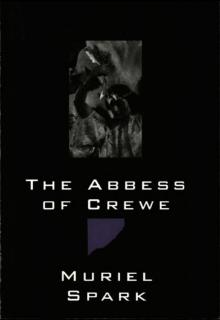 The Abbess of Crewe: A Modern Morality Tale
The Abbess of Crewe: A Modern Morality Tale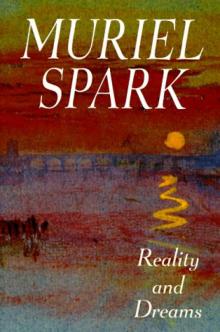 Reality and Dreams
Reality and Dreams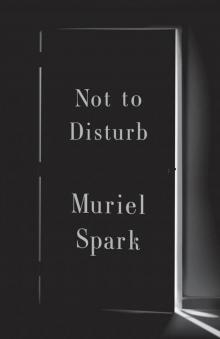 Not to Disturb
Not to Disturb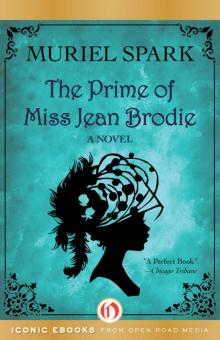 The Prime of Miss Jean Brodie
The Prime of Miss Jean Brodie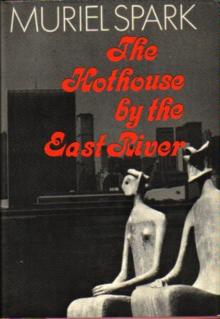 The Hothouse by the East River
The Hothouse by the East River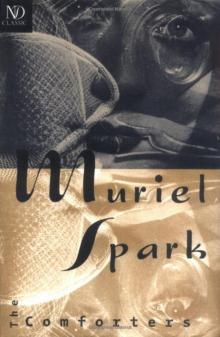 The Comforters
The Comforters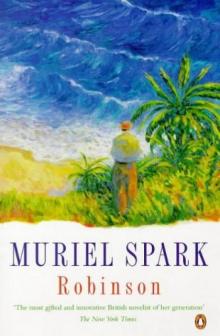 (1958) Robinson
(1958) Robinson Unknown
Unknown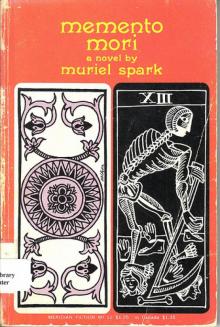 Memento Mori
Memento Mori The Finishing School
The Finishing School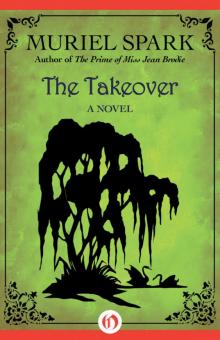 The Takeover
The Takeover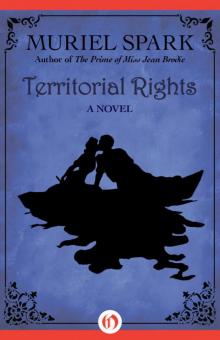 Territorial Rights
Territorial Rights The Complete Short Stories
The Complete Short Stories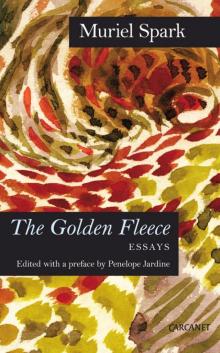 The Golden Fleece: Essays
The Golden Fleece: Essays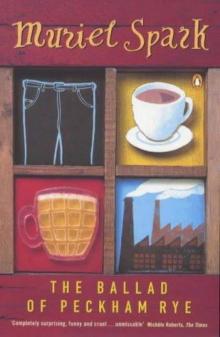 The Ballad of Peckham Rye
The Ballad of Peckham Rye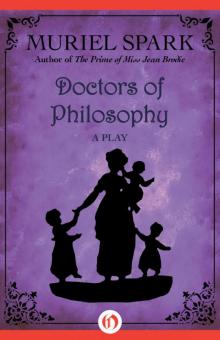 Doctors of Philosophy: A Play
Doctors of Philosophy: A Play The Mandelbaum Gate
The Mandelbaum Gate Loitering With Intent
Loitering With Intent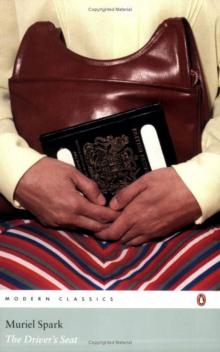 The Driver's Seat
The Driver's Seat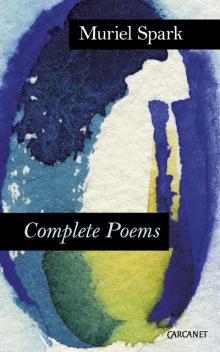 Complete Poems: Muriel Spark
Complete Poems: Muriel Spark Symposium
Symposium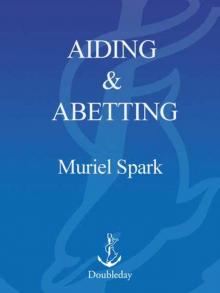 Aiding and Abetting
Aiding and Abetting The Golden Fleece
The Golden Fleece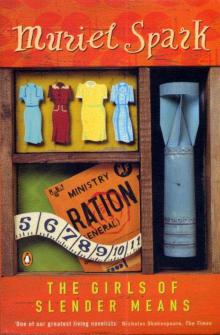 The Girls of Slender Means
The Girls of Slender Means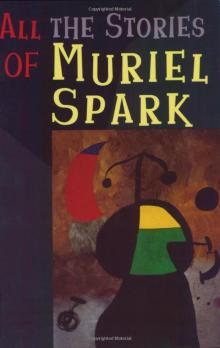 Alice Long’s Dachshunds
Alice Long’s Dachshunds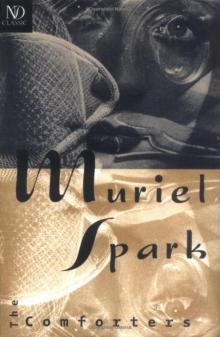 (1954) The Comforters
(1954) The Comforters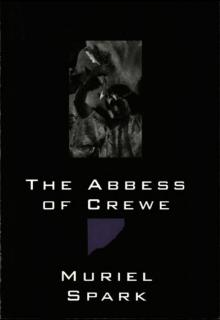 The Abbess of Crewe
The Abbess of Crewe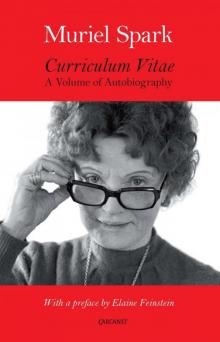 Curriculum Vitae
Curriculum Vitae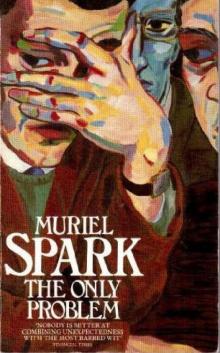 The Only Problem
The Only Problem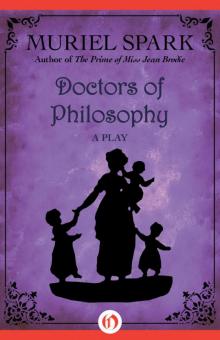 Doctors of Philosophy
Doctors of Philosophy